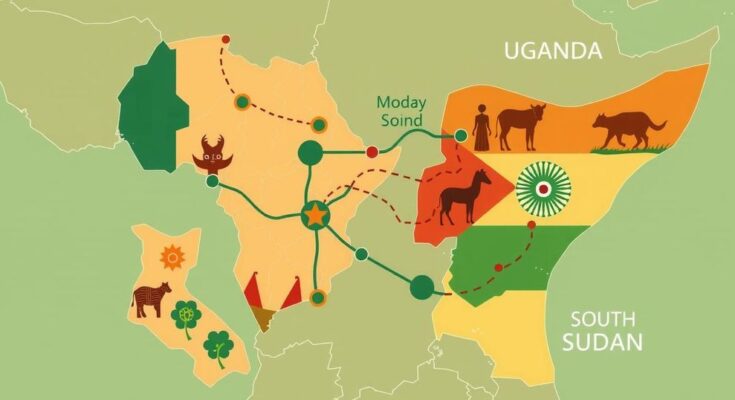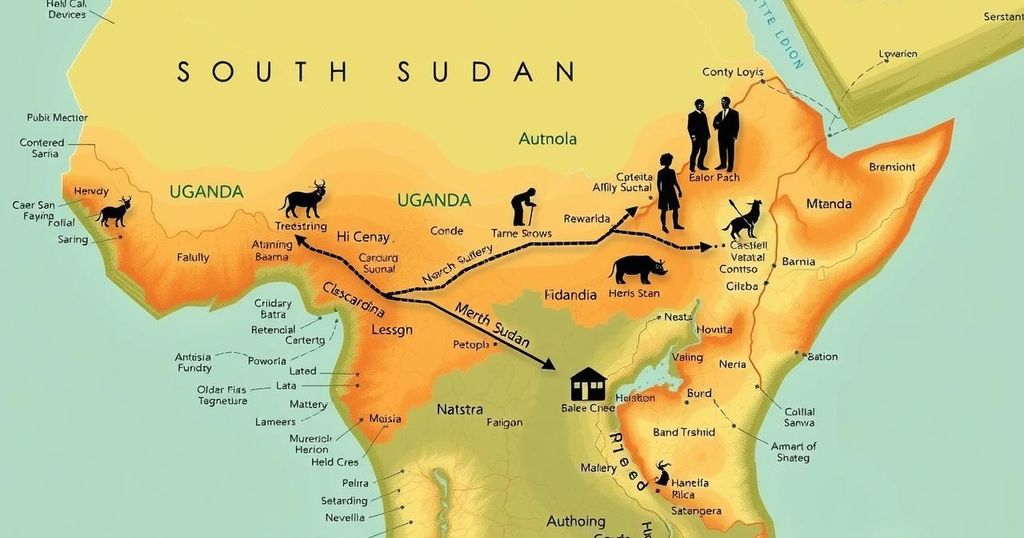This article discusses the complex relationship between South Sudan and Uganda, highlighting historical support, military interventions, tensions arising from civil conflict, and the implications for regional stability. It emphasizes the need for South Sudan to diversify its international partnerships and address governance challenges to maintain sovereignty and security amidst external influences.
South Sudan, the world’s youngest nation, faces a pivotal moment as it navigates its complicated relationship with Uganda. Their historical ties, rooted in cultural connections and differing political agendas, impact regional stability and economic prospects. Uganda has been an instrumental ally during South Sudan’s fight for independence, providing military support, particularly in the battle against the Sudanese government and the Lord’s Resistance Army (LRA).
Since attaining independence on July 9, 2011, South Sudan’s ties with Uganda have been characterized by a mixture of collaboration and rivalry. The former has relied on Uganda for market access and industrial support, while Uganda has facilitated peace processes via regional organizations such as the Intergovernmental Authority on Development (IGAD). Furthermore, Uganda continues to play a significant role in ensuring vital trade routes for landlocked South Sudan.
Despite these cooperative efforts, tensions have surfaced, especially following the outbreak of civil conflict in December 2013. The deployment of the Ugandan People’s Defense Force (UPDF) to bolster President Salva Kiir’s government has sparked controversy, further straining political relations and aggravating tensions among South Sudanese factions. The aftermath of such interventions has resulted in substantial humanitarian crises, with many displaced internally and across borders.
Although the civil war’s conclusion was marked by a 2018 peace agreement, South Sudan remains fragmented and faces a deepening humanitarian crisis. The interdependence of its relationship with Uganda has significant implications for regional geopolitics, particularly regarding interventions in neighboring countries such as the Democratic Republic of Congo and Somalia, often leading to violations of international laws.
The influence of Uganda extends into South Sudan’s internal politics, with accusations of bias from opposition groups against President Kiir. This dynamic complicates the internal power struggle and heightens regional tensions, particularly from neighboring states that support various factions in South Sudan. Additionally, competition for economic influence plays out across crucial trade sectors and oil resources, with Uganda eyeing investments in South Sudan’s oil infrastructure.
As both nations assert their interests, especially in trade and energy supply, tensions surrounding resource control are likely to increase. South Sudan’s strategic position in the Horn of Africa adds a layer of complexity, drawing global powers concerned with investment opportunities linked to its natural resources.
Furthermore, Uganda’s stability and influence across East Africa heighten its interest in South Sudan’s fate, while its own diplomatic relations may suffer from its alliance with Kiir’s administration. International organizations such as the United Nations have catalyzed Uganda’s approach, prompting calls for a neutral stance that encourages dialogue among opposing factions.
To navigate its relationship with Uganda effectively, South Sudan must develop a diplomatic strategy that safeguards its sovereignty while managing its economic and military dependencies. Engaging with a diverse range of international partners, including Ethiopia and Kenya, would promote a more balanced foreign policy, yet South Sudan must also tackle internal governance issues to diminish foreign interventions in domestic matters.
Through fostering inclusive governance and prioritizing genuine peacebuilding, South Sudan can work towards enhancing its sovereignty amidst competing regional interests and external pressures.
In conclusion, South Sudan’s relationship with Uganda is pivotal for its stability and future economic prospects. While Uganda has historically supported South Sudan’s independence, ongoing military involvement and geopolitical maneuvering complicate their ties. Therefore, South Sudan leaders must adopt a balanced foreign policy, engage diverse partners, and address internal governance challenges to safeguard their sovereignty and reduce vulnerabilities to external influences.
Original Source: www.radiotamazuj.org




